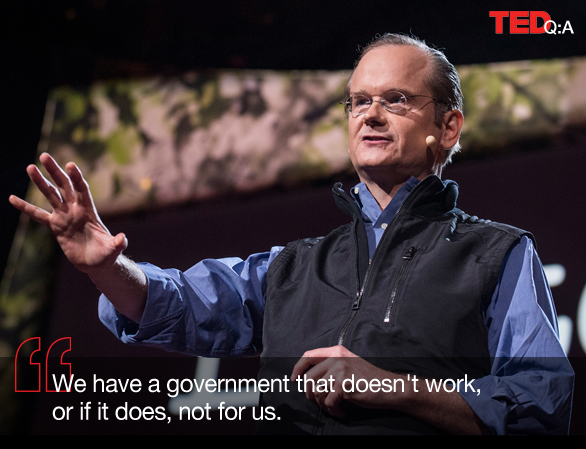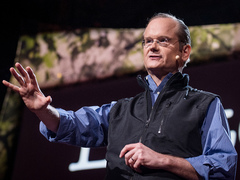 When it comes to US politics, many are frustrated that gridlock and grandstanding so often substitute for the hard job of getting things done. Just 14% of Americans say they approve of the work that Congress is doing, according to a recent Gallup poll. (Which, as a recent TED speaker notes, is lower than the approval rating for cockroaches, though higher than meth labs.)
When it comes to US politics, many are frustrated that gridlock and grandstanding so often substitute for the hard job of getting things done. Just 14% of Americans say they approve of the work that Congress is doing, according to a recent Gallup poll. (Which, as a recent TED speaker notes, is lower than the approval rating for cockroaches, though higher than meth labs.)
Underlying that disappointment is a central corruption in our electoral system, says legal activist Lawrence Lessig: the fact that Congressional candidates depend on funding from a tiny percentage of citizens, who in turn control what the rest of us get to vote on.
 Lawrence Lessig: We the People, and the Republic we must reclaim
That’s the argument at the core of his blistering talk from TED2013. In his new TED Book, Lesterland, Lessig takes a deeper look at the problem and describes a powerful method for fixing this broken system.
Lawrence Lessig: We the People, and the Republic we must reclaim
That’s the argument at the core of his blistering talk from TED2013. In his new TED Book, Lesterland, Lessig takes a deeper look at the problem and describes a powerful method for fixing this broken system.
In the great literary tradition of metaphors, Lessig has created Lesterland, a large country run by a small group of people named Lester. In the book, he uses Lesterland to describe what happens when the wealthy control the powerful. While political corruption is not new, Lessig believes we now have both the technology and the social media tools needed to expose and strike at the root of this corruption. To hear more about his ideas, and how he arrived at this metaphor, we caught up with Lessig and asked him a few questions.
Your book paints a pretty grim view that our political system is undermined by money and corruption. How did we allow this to happen?
We allowed it to happen simply because we’re busy with our lives: We’ve got jobs, or kids, or hobbies — maybe all together! We expect the Congress to do their job. Most of us don’t have the patience to try to keep up.
Why has this system of corruption taken hold so firmly?
Because it pays so well. K Street — where most lobbyist offices are in Washington, D.C. — has become one of the most profitable businesses in America. And they have convinced other businesses across America that they need K Street. So the cycle feeds itself: businesses pay lobbyists; lobbyists channel money to politicians; politicians reward the businesses.
What gives you hope that we can change this cycle?
The only hope is that most Americans get this and — if pushed — will create the political force to change it. What we need to do now is to push them.
How do we do that? What can the average person do?
The first step is to get involved. I started an organization called Rootstrikers — inspired by Thoreau’s quote: “there are a thousand hacking at the branches of evil to one striking at the root” — which recruits citizen teachers: people who recognize the corrupting influence of money and who are willing to help spread this message. At Rootstrikers you can be assigned tasks to help do that essential work. If we’re successful, then we will create the political conditions necessary to make reform possible.
Any other specific ideas you have for how we can turn things around?
The problem isn’t simple, but the first step is a no-brainer: We have to change the way elections are funded. If we change that, we make every other change possible. If I were King for a Day, at a minimum, I’d enact John Sarbanes’ Grassroots Democracy Act. More ambitiously, I’d enact the American Anti-Corruption Act put forwarded by the Represent.us organization.
What are the consequences of the corrupt and money-driven system we live with?
It’s very simple — a government that doesn’t work, or if it does, not for us. None of the most important issues facing us today can be addressed sensibly given the senselessness of this system: climate change, health care, financial reform, food safety, a tax system, the debt, inequality. You name it, and I’ll tie it to the money.
The folks who are pulling the strings — the Lesters — have a lot to lose if your ideas are implemented. Do you expect to see an active quashing of your ideas?
The closer we get, the more they will squeal. We need to have in place the political force that can overcome that squeal.
Lesterland is available for Kindle and Nook, as well as through the iBookstore. Or download the TED Books app for your iPad or iPhone.
Comments (9)